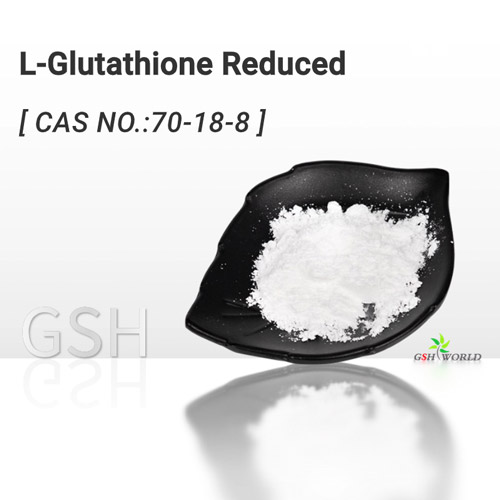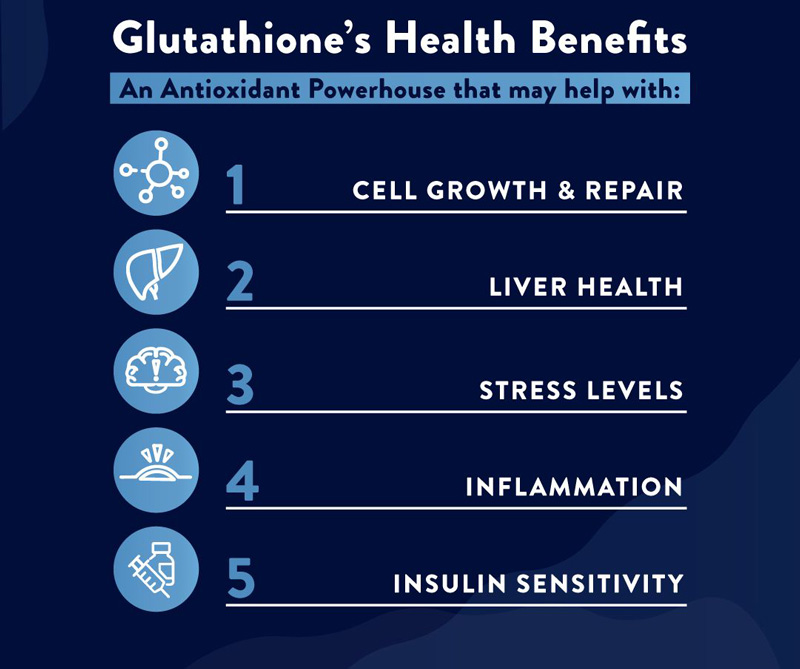If you’re looking to substantially boost your health and well-being, you may want to consider glutathione (commonly known as GSH).
Glutathione is a molecule found in every cell in the body and is made up of three amino acids (cysteine, glutamate, and glycine) that combine to form a simple protein, which is what it does – it’s an antioxidant that kills all free radicals and then removes them from the body.
In fact, glutathione is called “the world’s most important antioxidant” because of its ability to neutralize toxic chemicals that we are often exposed to, such as heavy metals, cosmetics, and pollution.
However, starting around age 25, the body’s natural ability to produce glutathione begins to wane, and these modern environmental stresses further reduce our levels. Glutathione supplier
When oxidative stress in the body (defined as an imbalance that causes cell and tissue damage) gets too high, we start to see all sorts of diseases: obesity, diabetes, high blood pressure, heart disease, metabolic disorders.
The good news is that we can boost our levels of this powerful antioxidant in a number of ways.
Glutathione is found naturally in proteins (such as beef and poultry), green vegetables (such as kale and spinach), and sulfur-rich cruciferous vegetables (such as broccoli, cauliflower, and Brussels sprouts).
Eating foods rich in vitamin C, including citrus fruits, kiwi and strawberries, can also boost glutathione levels.

Supplementation is another option. A randomized controlled trial published in the European Journal of Nutrition found that taking 500-1,000 mg of glutathione supplement daily was effective in increasing glutathione storage.
Below we highlight eight proven health benefits of this major antioxidant.
1. Reduce oxidative stress
According to an article published in the journal Nutrition, glutathione has been found to be a “promising and exciting” treatment against cell and tissue damage.
This study shows that GSH supplementation with amino acids (including L-glycine) and micronutrients (including vitamins C, vitamin E, and magnesium) and specific dietary patterns (vegetarian, Mediterranean, and DASH diets) have the potential to increase glutathione concentrations, thereby slowing the rate of tissue deterioration.
Glutathione can reduce oxidative stress in the body.
2. Helps increase insulin levels
Higher levels of glutathione can reduce the amount of fat stored in the abdomen, thereby reducing the risk of developing some types of diabetes.

Researchers at Baylor College of Medicine in Houston combined studies on older adults and older mice because both groups of mice are deficient in glutathione, a common side effect of aging.
Less than two weeks after the volunteers were instructed to eat foods containing cysteine and glycine, such as lentils and sunflower seeds, their ability to burn body fat jumped to a rate similar to that of the average young adult.
3. It can reduce the side effects of type 2 diabetes
The study authors gathered a small group of sedentary adults with uncontrolled type 2 diabetes and “severe deficiencies” in glutathione levels and injected them with cysteine and glycine dietary supplements over two weeks.
The findings, published in the journal Diabetes Care, found that supplements restored glutathione levels and reduced oxidative damage caused by high blood sugar.
4. Lower your risk of heart disease
In an animal study conducted at the University of Michigan Health System, scientists fed a grape-rich diet to mice with hypertension (chronic high blood pressure), which were at a higher risk of heart failure
After 18 weeks, the authors found that the antioxidants in the fruit “switched on” the antioxidant defense pathway, ultimately boosting the activity of genes that promote glutathione production.

In addition, the mice had fewer cases of hypertrophy in their heart muscles and better diastolic function (the number at the bottom of the blood pressure reading indicates how much pressure the blood is exerting on the artery walls with each heartbeat).
5. May help liver function
Glutathione can an effective treatment for liver damage caused by excessive alcohol consumption.
Medical researchers from Italy used an intravenous drip filled with high doses of glutathione to treat adults with alcoholic or non-alcoholic fatty liver disease.
Months after the trial ended, both groups had “significant” improvements not only in bilirubin levels – a substance produced in the liver during the normal breakdown of red blood cells that healthy livers regularly eliminate – but also in malondialdehyde, a marker of liver cell damage.
6. Helps prevent obesity
If the body low in glutathione, environmental toxins metabolized in fat tissue, which means the body keeps excess weight.
According to a study published in the journal Experimental and Therapeutic Medicine, adults diagnosed with metabolic syndrome – multiple health conditions such as high blood pressure, high blood sugar, high cholesterol, and a large waist circumference – may be at increased risk.

People with heart disease, diabetes, and stroke, as defined by the National Institutes of Health, as well as those who initially tested for higher levels of glutathione, experienced significant decreases in weight and body fat percentage after following a personalized healthy eating plan for six months.
7. May help fight autoimmune problems
If glutathione affects all metabolic disorders, then it also includes autoimmune diseases.
Research published in the journal Autoimmune Reviews found a strong association between oxidative stress and apoptosis – the controlled process of cell death – in patients with lupus, an autoimmune disease in which the immune system mistakenly attacks healthy cells and tissues.
Glutathione consumption found to “strongly associated” with the destruction of cells.
Side effects and risks of glutathione
The FDA (Food and Drug Administration) says glutathione “generally recognized as safe.”
However, it is important to keep in mind that the National Institutes of Health (NIH) states that most supplements contain active ingredients that may cause a reaction.

One study found that there may be some interactions among men who take glutathione as a skin treatment through an intravenous drip, including liver problems or infertility, which is why the FDA is warning the public about the dangers of injectable skin lighteners.
Another study (in which patients took both glutathione and oxidized GSSG) showed that a very small number of participants developed temporary liver problems or rashes.
Most glutathione studies have used either intravenous or oral glutathione, and typically used doses that may range from 500 mg to 2 grams.
This is because absorption is quite poor and breaks down into various amino acids, which can have different side effects.



